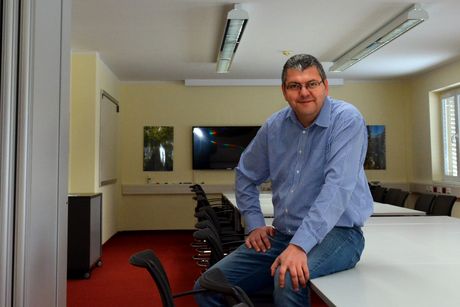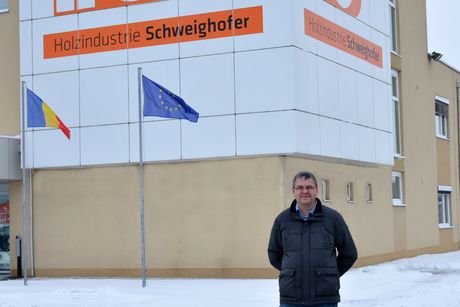Challenges are like a heartbeat: Interview with Paul Balan, Group IT Director Holzindustrie Schweighofer Romania
He was dreaming of going to the Police Academy.
A small surgery, however, derailed his plans. He shifted gear and became a student in Letters, at the University of Iasi. “I was in the lecture hall, looking around and seeing only three boys among 300 girls, I said to myself that that was not the place for me…” So he left for Constanta, where he studied management for two years at a private university. There, the Mathematics professor in the second year changed the course of his life forever. Paul Balan today is Group IT Director for the Schweighofer Group in Romania.
It has become almost self-evident that any new employee at Holzindustrie Schweighofer Romania must undergo a ‘rite of passage’ designed by Paul Balan, the man without whom the group’s IT systems would not function optimally.
Be it the deceiving of newcomers by making prank calls or staging a situation which can bring even the most hard-hearted employees on the brink of a heart attack, Paul’s pranks have become both legendary and part of every-day life.
“I always tried to combine work with fun, to focus on something else apart from work, work, work,” explains Paul. “To make a joke every once in a while, to play a prank, to make someone feel better had I seen them a bit under the weather.”
Paul is a man with a plan, who has solution for most, if not for all unforeseen situations which are generated by working in the digital century.
From Letters to Computer Science, otherwise put, meeting the right person at the right time
Paul was born and raised in Rădăuți.
“I wanted to go to the Police Academy, but a small surgery took me out of the playing field” he remembers. “Then, I took and entrance exam at the Faculty of Letters, in Iasi, but when I saw that there were just three boys among 300 girls in the lecture hall, I told myself that was not my place. And I left. I was 19 years old and I went to Constanta, where I started studying management at a private University. We were studying economy, and civil and criminal law, and economic mathematics, but the future looked bleak, once we graduated…”
Providence, however, appeared in the form of the Mathematics professor, who told him frankly that he was wasting his time studying management and did not give up until Paul got accepted to the Mathematics – Computer Science Faculty at the Ovidius University in Constanta. “I was more technically-inclined, and the Mathematics professor in my second year sensed that my calling was not management, so he tutored me and he insisted until I agreed to take an entrance exam in Maths-Computer Science. And I got in. On a scholarship!” smiles Paul.
He worked for a company in the field during his student years in the seaside city. He tried his hand back then and, when he graduated, he left “to relax,” in Cyprus. “I went to see my older brother, but after a while I got bored, so in the end I got a job there as well, in Limassol,” remembers Paul. “I was head of service for an IT company and I was handling quite complicated issues, ranging from Immigration Services to Police business. I saw a different world there, with a different mentality. I laid the foundation for an online community of the Romanians living in Cyprus, with a website and all, and I’ve seen that the website is still operational.”
In 2005, Paul came back home, to Rădăuți.
“I now had experience in hardware, experience in software, I reckoned I had all I needed to start my own computer business in my hometown,” he adds. “And it went pretty well, it went so well that I managed, using my earnings from the company, to build my house from scratch. And I learned then to think ahead: instead of earning money for the moment, think of the future, plan and build strategically.”
“I didn’t even want to get hired by Schweighofer”
It was 2007, his business was doing OK and Paul was beginning to build a future for himself in the small city in Bukovina, when he found out that the Holzindustrie Schweighofer sawmill was hiring.
“That was a challenge for me, not necessarily an ardent wish to come work for Schweighofer,” he says jesting. “The only other candidate was a guy I wasn’t really fond of, so I interviewed as a kind of prank! I passed the interview, but I did not want the job. I didn’t have this huge wish to give up my status of a business owner and come work according to a schedule, with rules and for a quarter of what I used to make…”
Paul chuckles even now when he recounts how Nicky [Nichifor Tofan, the sawmill manager in Rădăuți], used to come every day, for more than a week, to his company’s premises. “He used to get in my store, pull a chair and talk to me. About all sorts of things, among which he attempted to convince me to come work for a company who had five people in an office in a refurbished church, and a plot on a field where it was building a factory!”
In the end, Nicky succeeded. Ten years after, the mill manager has not changed his opinion about the man he spent a lot of time trying to convince to take the job... “I was impressed by his problem-solving way of thinking,” says Nicky. “Any question I might have had during the interview, his invariable answer was ‘it can be done!’. I also liked his entrepreneurial skills, it was important for me to be able to trust people with organisational abilities, I wanted people who could lead teams. Paul was this kind of people.”
Moving into the new office building ensued, an event which took place on 1 October, 2008.
“For me, the first day of work in the new building lasted for about 26 hours,” remembers Paul. “I started in the morning, at 4 am, and I finished the following morning, at about 6 am! In theory, the entire servers’ infrastructure had to be moved, work stations, equipment and peripherals had to be moved, they all needed to be interconnected and synchronised, and I was the one and only employee of the department! The entire operation was a success, at the end of the working hours all services were operational.”
Challenges are like a heartbeat
For Paul, the biggest challenges in these past ten years were the moments before all became operational, when resources were rather limited and everything was done at a speed of light, but any problem had to have a solution.
The IT Director always has a plan.
“I have a problem, I always think proactively, I always think of the worst,” admits Paul. “We need procedures to solve real cases: should something really bad happen, how do we recover? We have safety plans, we have back-ups, everything is thought of in a worst case scenario. I make a mountain out of a molehill, even the management told me to be more flexible. This is crisis management with a twist, but it is efficient.”
It’s not about pessimism or an apocalyptic imagination, and being ultra-vigilant, although it might seem annoying, pays off.
In the spring of last year, the WannaCry ransomware hit more than 200,000 companies in over 150 countries, with total damages standing in the range of billions of USD. Giant Renault has been hit in Romania, where the Dacia Plant in Pitesti has been a victim of the ransomware, the Romanian Ministry of Foreign Affairs and other several big names in reference industries have had their computers encrypted for a few good days.
Not even a hair moved at Holzindustrie Schweighofer.
“I prevented that attack,” says Paul. “At Holzindustrie Schweighofer we were prepared to face any type of ‘virus’, as people call them. We had an IT audit at some point, a bunch of ransomwares were simulated, of any kind, and the fact that people had been talked to and mentally prepared was of utmost importance, because they were all prepared and knew what to do. That was my proudest moment, to see the results of my work at a time when the entire management was worried, seeing that giants had fallen…”
At the moment, Paul leads a team of 12.
About three years ago he was offered the chance to develop a new project, which would have been yet another one started from scratch. “I said no because I like the people I work with,” he says. “It was three years ago when I was approached with an offer which would have literally doubled my income. I got to a level where the main attraction for me is no longer how much money I make. I literally can’t wait to come to work on Monday mornings, I welcome challenges, new jobs, new challenges for me to find solutions. I like the people I work with. As I was here from the beginning I saw all types of people, we did many things together. And then, when I saw that offer, it hit me that I would have had to give them all up for money. And, despite the fact that I was offered double the money and that I was to run a new, built-from-zero project, I said ‘no’, and I said ‘no’ because of the team.”
His colleagues seem to be on the same wavelength.
“Paul is a team player,” says Vasile Varvaroi, the log purchasing manager, who himself was there from the beginning. “We used to interact pretty often when we were a smaller team, we learned from him and he learned from us, he answered any question be it day or night. He is friendly, he’s a funny guy, who’s also pretty involved in the community and in social causes.”
Human resources manager Sorina Răuțu sums it up the best: “What can one say about Paul? He’s enthusiastic, he’s the best IT person I know, he never said ‘no’ and he loves challenges. Challenges are like a heartbeat for him!”




